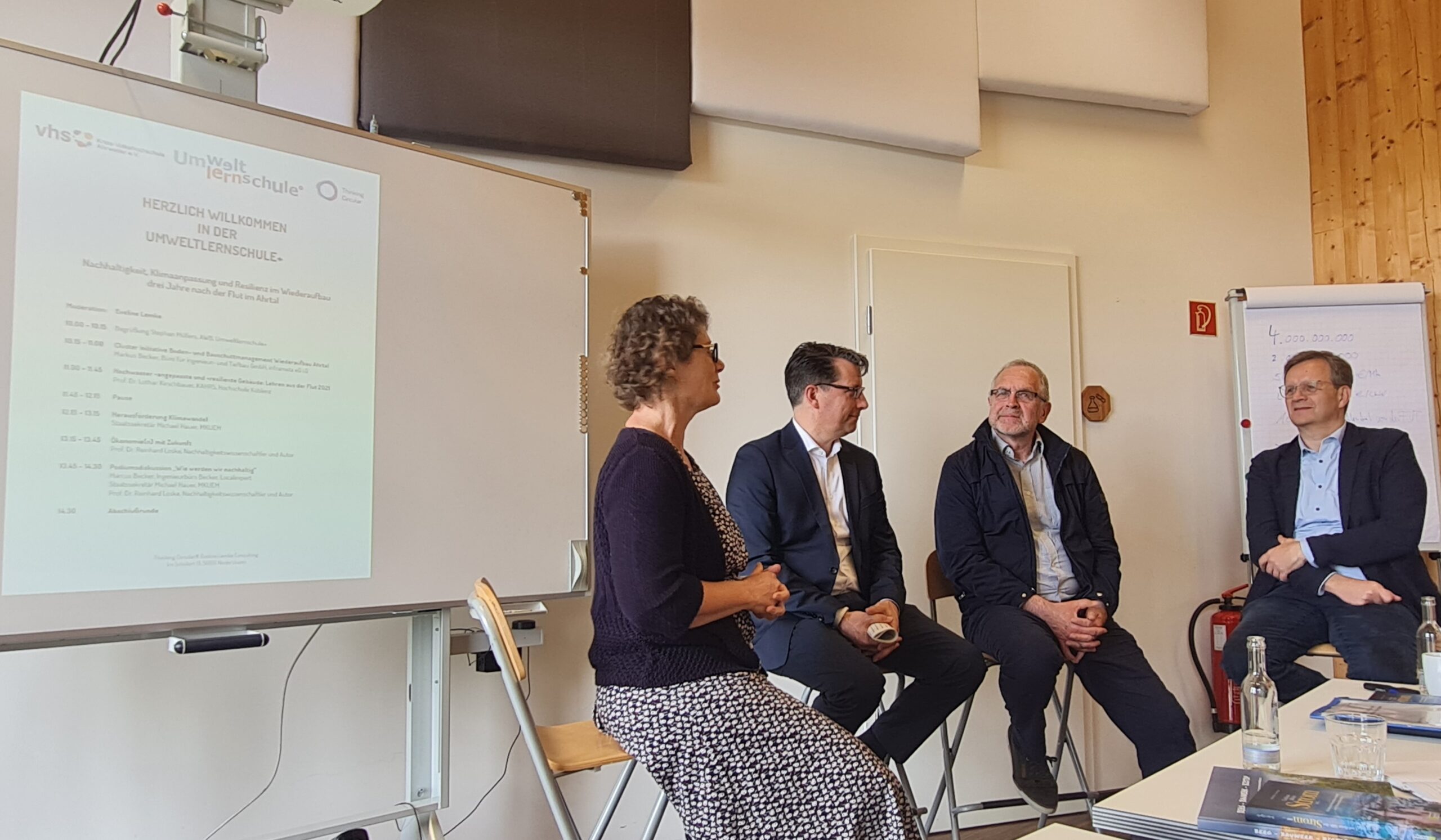
07.2024 Sustainability, climate adaptation and resilience in reconstruction three years after the flood in the Ahr valley
These days, many people and institutions are looking back on the flood in the Ahr valley in 2021. As part of the cooperation project between the Environmental Learning School+, Thinking Circular® and the Ahrweiler District Adult Education Centre, Stefan Müllers, Technical Director of the Ahrweiler waste management company, and Christian Hofeditz, Director of the Ahrweiler District Adult Education Centre, looked back on the past year in particular. They focused on their own activities in the Environmental Learning School+ and the events organised with the adult education centre on sustainability, climate adaptation and resilience. For the progress made in rebuilding the Ahr Valley with science, politics and society, they also brought in expertise and an outside perspective.
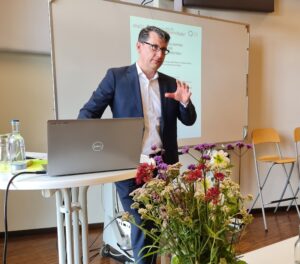
Staatssekretär Michael Hauer, MKUEM
Overall, Stefan Müllers noted that the Environmental Learning School+ has developed extremely well since the coronavirus break. The number of staff is fully utilised, the capacity of the premises could be utilised even more, but overall, with around 2,500 children, young people and adults benefiting from this educational offer, the expectations of what is possible have been met. Christian Hofeditz emphasised that the training events organised with the climate protection managers from the district in particular went very well and could even be offered several times.
Eveline Lemke, former Minister of Economic Affairs and Climate Protection for the state of Rhineland-Palatinate and herself based in the district with her consultancy Thinking Circular®, prepared and moderated the event. Her lifeblood is closely linked to the Umweltlernschule+ organisation, as she was able to present the EU funding for the facility at the time. Today, she is also a volunteer environmental lecturer for the adult education centre. Reflection with her colleagues is therefore a matter close to her heart. As is the development of the circular economy, for example in soil management.
Soil and construction waste management cluster initiative offers solutions
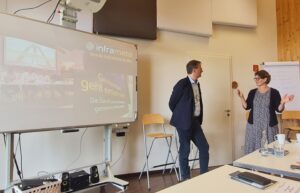
Markus Becker, Büro für Ingenieur- und Tiefbau GmbH, Eveline Lemke, Thinking Circular®
Solution steps were identified here. For example, the problem of the temporary storage of soil and building rubble, of which an estimated one million cubic metres still need to be moved in the Ahr valley for construction purposes. Markus Becker from Berthold Becker Büro für Ingenieur- und Tiefbau GmbH was the first to present the current status of the district’s soil and building rubble cluster. His office organises the cluster initiative. In the future, large construction projects such as the construction of flood defences will be an opportunity to reuse the large quantities of construction waste. So how can it be possible to store these masses temporarily rather than lorry them out of the valley first? State Secretary Michael Hauer from the State Ministry of the Environment promised that the establishment of interim storage facilities could be discussed once a calculation of the quantities to be stored had been submitted. He was happy to come to Niederzissen to the Environmental Learning Centre+ to discuss the further development of climate protection measures with those involved. The parties involved in land management were delighted to hear this news and will get to work on obtaining estimates or precise calculations of the quantities required for planned activities.
The presentation of Markus Becker’s lecture (in German) can be found here.
Recommendations from the KAHRS project
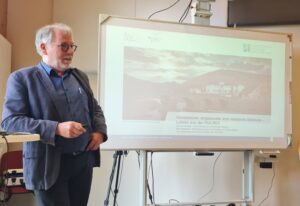
Prof. Dr. Lothar Kirschbauer, Hochschule Koblenz, KAHRS
Prof. Dr. Lothar Kirschbauer presented the results of the KAHR project and ten recommendations. He specifically addressed the recommendation to create more space for the Ahr and to strengthen inter-municipal cooperation. He also specifically recommended the installation of automatic flood bulkheads, the installation of pressurised water-proof wall ducts and the installation of house connections above the flood level.
The presentation of Prof Dr Lothar Kirschbauer’s lecture (in German) can be found here.
Policy(s) and economy(ies) with a future
Prof Reinhard Loske presents his theory on economics with a future. As a former environmental senator for the state of Bremen, member of the Bundestag and President of the Cusanus University of Applied Sciences in Koblenz, the transfer of theoretical knowledge into practical activities is close to his heart. His insights into the benefits of cooperation and good communication were confirmed by those present.
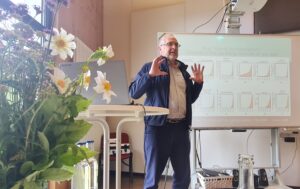
Prof. Dr. Reinhard Loske, Nachhaltigkeitswissenschaftler und Autor
The presentation of Prof Dr Reinhard Loske’s lecture can be found here.
At the end of the day’s event, it was clear to the network of environmental educators at the event that the abundance of tasks and the high fluctuation of people working and living in the Ahr Valley can only be tackled by everyone together and with solidarity, and that further educational programmes can be provided that can help in this area. The participants then agreed to continue to drive this forward.